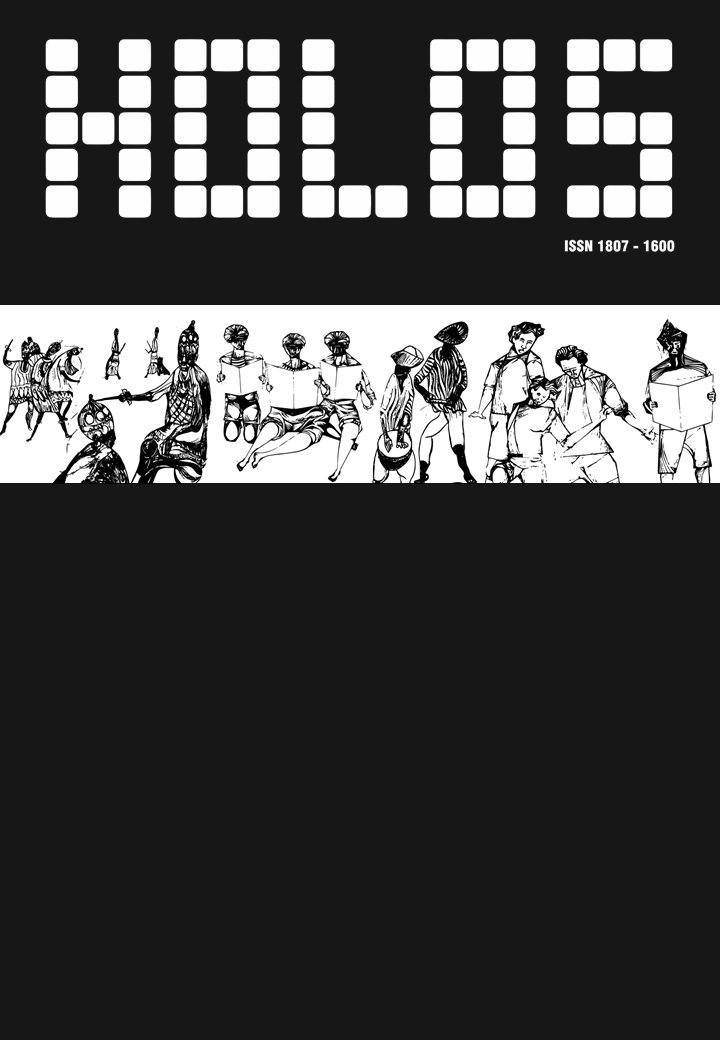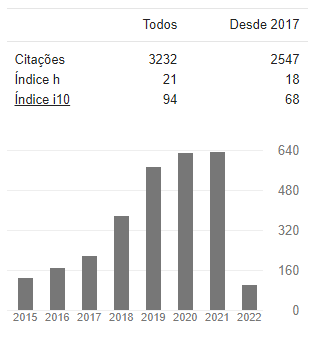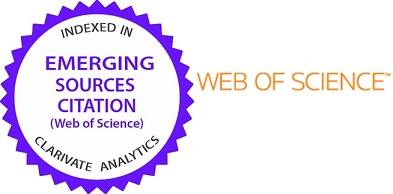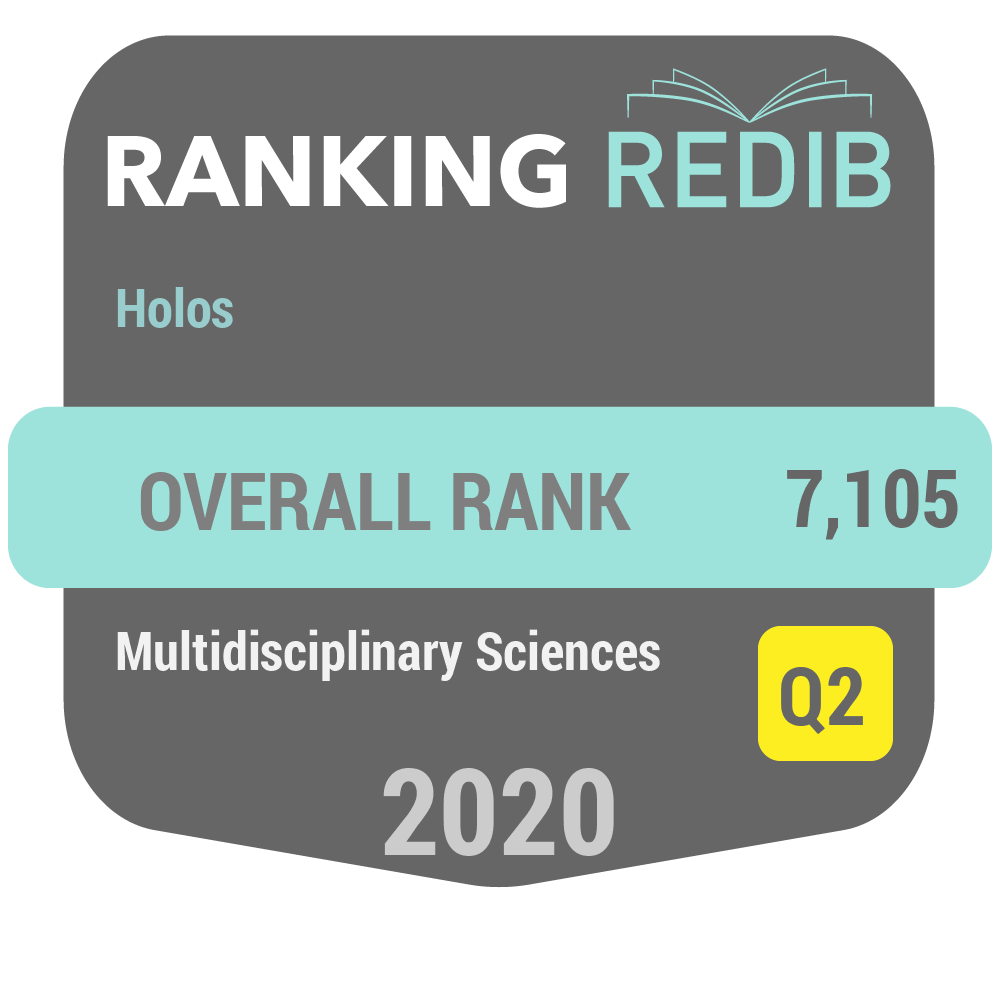Resilience of the Brazilian supply chains due to the impacts of Covid-19
DOI:
https://doi.org/10.15628/holos.2020.10802Palavras-chave:
Supply Chain, Long Chain, Short Chain, Covid-19, ResilienceResumo
Unprecedented challenges have been imposed on global markets to minimise losses in the short and long supply chains. The purpose of this paper is to identify the impacts created by the Covid-19 pandemic on the short and long supply chains in Brazil. This paper analyses the short and long supply chains in Brazil, whose overriding data were consulted on the websites of supervisory bodies and agencies at home and abroad. Adopting a qualitative approach, the consultation of literature about short and long supply chains was to determine the impacts of the pandemic on them in Brazil, as well as the resilience adopted by many in the course of the outbreak of the new coronavirus. This study examines the resilience of the Brazilian supply chains when pointing out the impacts on them during the Covid-19 pandemic and the alternatives to continue operating. It was also found that short supply chain resilience plays a key role in the Brazilian food supply. The study is restricted to the context of Brazil and its particularities. Also, further studies are required to explore the economic and operating impacts on different sectors of the economy in the post-pandemic period.
Downloads
Referências
Ação Direta de Inconstitucionalidade n. 6343 (2020). Provides on the decision of the Supreme Court of Brazil that states and municipalities, within their powers and territory, can adopt restrictive measures for intermunicipal and local travel, respectively, during the state of emergency arising from the pandemic, without requiring authorisation from then Health Ministry to decree isolation, quarantine and other measures. Retrieved from http://portal.stf.jus.br/processos/detalhe.asp?incidente=5881008
Agência Nacional de Aviação Civil-ANAC (2020, April) [Brazilian Civil Aviation Agency]. Demanda e Oferta do Transporte Aéreo. [Demand and Supply of Air Transport] Retrieved from https://app.powerbi.com/view?r=eyJrIjoiOWM1N2U2ODEtOWNiNy00YWU2LTkxZTctMTJiNDM2YzYxOGI2IiwidCI6ImI1NzQ4ZjZlLWI0YTQtNGIyYi1hYjJhLWVmOTUyMjM2ODM2NiIsImMiOjR9.
Agência Nacional de Aviação Civil-ANAC (2020b, April 14). Anac aprova transporte aéreo exclusivo de carga em cabine de passageiros. [Anac approves airfreight solely in passenger cabin] Retrieved from https://www.anac.gov.br/noticias/2020/anac-aprova-transporte-aereo-exclusivo-de-carga-em-cabine-de-passageiros.
Agência Nacional de Transportes Aquáticos (2020) [Brazilian Waterway Transport Agency]. O desempenho portuário nacional frente à pandemia da COVID-19. [Brazilian port performance regarding the Covid-19 pandemic] Retrieved from http://portal.antaq.gov.br/wp-content/uploads/2020/05/O_desempenho_ portuario_nacional_frente_a_pandemia_da_Covid_19__v1.3_.pdf .
Açikgöz, O., & Günay, A. (2020). The early impact of the Covid-19 pandemic on the global and Turkish economy. Turkish Journal of Medical Sciences, 50, 520–526. https://doi.org/10.3906/sag-2004-6.
Araz, O.M., Choi, T.-M., Olson, D., Salman, F.S.(2020). Data analytics for operational risk management. Decision Sci forthcoming.
Baldwin, R. & Tomiura, E. (2020). Thinking ahead about the trade impact of COVID-19. In Baldwin, R., & di Mauro, B. W. (Ed.), Economics in the Time of COVID-19, (pp. 59-69). London, United Kingdom: Centre for Economic Policy Research.
Boone, L. (2000). Tackling the fallout from COVID-19. In Baldwin, R., & di Mauro, B. W. (Ed.), Economics in the Time of COVID-19, (pp. 37-44). London, UK: Centre for Economic Policy Research.
Bowersox, D. J., Carter, P. L., & Monczka, R. M. (1985). Materials logistics management. International Journal of Physical Distribution & Materials Management.
Bowersox, D. J., Closs, D. J., & Helferich, O. K. (1996). Logistical management (Vol. 6). New York: McGraw-Hill.
Bruno, Regina. (2016). Desigualdade, Agronegócio, Agricultura Familiar no Brasil. Estudos, Sociedade e Agricultura 24(1) [Inequality, Agribusiness, Family Farming in Brazil. Studies, Society and Farming].
Cavalcante, A., & Campolina, B. (2020). Desafios e Propostas para Enfrentamento do COVID-19: Território, Escala e Planejamento (No. 009) [Challenges and projects to tackle the Covid-19: Territory, Scale and Planning]. Cedeplar, Federal University of Minas Gerais (UFMG), Brazil.
Cooper, M. & Ellram, L. (1993). Characteristics of Supply Chain Management and the Implications for Purchasing and Logistics Strategy. The International Journal of Logistics Management, 4(2), 13–24. https://doi.org/10.1108/09574099310804957
Cooper, M. C., Lambert, D. M., & Pugh, J. D. (1997). Supply chain management: more than a new name for logistics. The International Journal of Logistics Management, 8(1), 1-14.
Christopher, M. (2000). The agile supply chain: competing in volatile markets. Industrial Marketing Management, 29(1), 37-44.
Christopher, M., & Peck, H. (2004). Building the resilient supply chain. International Journal of Logistics Management, 15(2), 1–19.
Cappelli, A., & Cini, E. (2020). Will the COVID-19 pandemic make us reconsider the relevance of short food supply chains and local productions? Trends in Food Science & Technology, 99, 566.
Cowling, B. J., Ali, S. T., Ng, T. W., Tsang, T. K., Li, J. C., Fong, M. W., ... & Wu, J. T. (2020). Impact assessment of non-pharmaceutical interventions against coronavirus disease 2019 and influenza in Hong Kong: an observational study. The Lancet Public Health.
Decope (2020). Pesquisa IMPACTO DO CORONAVÍRUS NO TRC. [Study Coronavirus Impact on TRC] Retrieved from https://www.portalntc.org.br/images/jce/RESULTADO-PESQUISA-IMPACTO-VOLUME-CARGA-11_SEMANA.pdf
Decree n. 10.282, dated 20 March 2020. Regulates Law no. 13.979, dated 6 February 2020, to define the public services and essential activities. Retrieved from http://www.planalto.gov.br/ccivil_03/_ato2019-2022/2020/decreto/D10282.htm
Decree n. 10.285, dated 20 March 2020. Reduz temporariamente as alíquotas do Imposto sobre Produtos Industrializados - IPI incidentes sobre os produtos que menciona. [Temporarily reduces excise tax rates on the listed products]. Retrieved from http://www.planalto.gov.br/CCIVIL_03/_Ato2019-2022/2020/ Decree/D10285.htm
Decree n. 10.302, dated 01 April 2020. Reduz temporariamente as alíquotas do Imposto sobre Produtos Industrializados - IPI incidentes sobre os produtos que menciona. [Temporarily reduces excise tax rates on the listed products]. Retrieved from http://www.planalto.gov.br/ccivil_03/_ato2019-2022/2020/decreto/ D10302.htm
Decree n. 10.329, dated 28 April 2020. Alters Decree no. 10.282, dated 20 March 2020, which regulates Law no. 13.979, dated 6 February 2020, to define public services and essential activities. Retrieved from http://www.planalto.gov.br/ccivil_03/_ato2019-2022/2020/decreto/D10329.htm
Di Mauro, B.W. (2000). Macroeconomics of the flu. In Baldwin, R., & di Mauro, B. W. (Ed.), Economics in the Time of COVID-19, (pp. 31-36). London, UK: Centre for Economic Policy Research.
Domingues, E. P., Cardoso, D. F., & Magalhães, A. S. (2020). A pandemia do Corona vi?rus no Brasil: demanda emergencial de setores relacionados a sau?de e impactos econo?micos. [Coronavirus pandemic in Brazil: Emergency demand of sectors related to health and economic impacts] (No. 002). Cedeplar, Federal University of Minas Gerais.
Fernandes, N. (2020). Economic effects of coronavirus outbreak (COVID-19) on the world economy. Available at SSRN 3557504.
International Air Transport Association (2020). COVID-19. Retrieved from https://www.iata.org/en/iata-repository/publications/economic-reports/coronavirus-initial-impact-assessment/
Ivanov, D. (2020). Predicting the impacts of epidemic outbreaks on global supply chains: A simulation-based analysis on the coronavirus outbreak (COVID-19/SARS-CoV-2) case. Transportation Research Part E: Logistics and Transportation Review, 136, 101922.
Jain, V., Benyoucef, L., & Bennett, D. (2008). Managing long supply chain networks: some emerging issues and challenges. Journal of Manufacturing Technology Management.
Jüttner, U., & Maklan, S. (2011). Supply chain resilience in the global financial crisis: an empirical study. Supply Chain Management: An International Journal.
Lambert, D. M., & Stock, J. R. (1993). Strategic logistics management (Vol. 69). Homewood, IL: Irwin.
Lambert, D. M., & Cooper, M. C. (2000). Issues in supply chain management. Industrial Marketing Management, 29(1), 65-83.
Law no. 13,979, dated 06 February 2020. Provides on the measures to tackle the internationally important public health emergency arising from the coronavirus responsible for the 2019 outbreak. Retrieved from http://www.planalto.gov.br/ccivil_03/_ato2019-2022/2020/lei/L13979.htm
Law no. 13,982, dated 2 April 2020. Amends Law no. 8,742, dated 07 December 1993, providing on additional characterisation parameters of the social vulnerability status for purposes of eligibility for continued benefit payments ((BPC), and establish exceptional measures of social protection to be adopted during the period of the internationally important public health emergency arising from the coronavirus (Covid-19) responsible for the 2019 outbreak, referred to in Law no. 13,979, dated 06 February 2020. Retrieved from http://www.planalto.gov.br/ccivil_03/_ato2019-2022/2020/lei/L13982.htm
Leung, K., Wu, J. T., Liu, D., & Leung, G. M. (2020). First-wave COVID-19 transmissibility and severity in China outside Hubei after control measures, and second-wave scenario planning: a modelling impact assessment. The Lancet.
Majid, A. (2020). Pakistan’s Supply Chain Resilience. Retrieved from https://hcommons.org/deposits/item/hc:29269/.
Mentzer, J. T., DeWitt, W., Keebler, J. S., Min, S., Nix, N. W., Smith, C. D., & Zacharia, Z. G. (2001). Defining Supply Chain Management. Journal of Business Logistics, 22(2), 1–25.
Medidas Provisórias [Provisional measures] no. 924, dated 13 March 2020. Opens extraordinary credit for the Ministries of Education and Health to the sum of BRL 5.099.795.979,00 for its specified purposes. Retrieved from http://www.planalto.gov.br/CCIVIL_03/_Ato2019-2022/2020/Mpv/mpv924.htm
Medida Provisória n. 936, dated 1 April 2020. Institutes the emergency job and income maintenance programme. Retrieved from http://www.planalto.gov.br/ccivil_03/_ato2019-2022/2020/mpv/mpv936.htm
Medida Provisória n. 940, dated 2 April 2020. Opens extraordinary credit for the Health Ministry to the sum of BRL 9.444.373.172,00, for its specified purposes. Retrieved from http://www.planalto.gov.br/ CCIVIL_03/_Ato2019-2022/2020/Mpv/mpv940.htm
McKibbin, W. J., & Fernando, R. (2020). The global macroeconomic impacts of COVID-19: Seven scenarios.
Ministério da Economia [Ministry of the Economy] (2020). Ações de combate à COVID-19. Retrieved from https://www.gov.br/economia/pt-br/centrais-de-conteudo/publicacoes/boletins/covid-19/timeline/abril/17-de-abril-de-2020.
Ministério da Saúde. [Health Ministry] (2020a, January). Boletim Epidemiológico 01 51(01). Retrieved from https://www.saude.gov.br/images/pdf/2020/janeiro/15/Boletim-epidemiologico-SVS-01.pdf.
Ministério da Saúde. (2020b, January). Boletim Epidemiológico 02 51(02). Retrieved from https://www.saude.gov.br/images/pdf/2020/janeiro/20/Boletim-epidemiologico-SVS-02-1-.pdf.
Ministério da Saúde. (2020c, March). Boletim Epidemiológico – COE COVID-19 04/03/2020. Retrieved from https://www.saude.gov.br/images/pdf/2020/marco/04/2020-03-02-Boletim-Epidemiol--gico-04-corrigido.pdf.
Ministério da Saúde (2020d, April). Boletim Epidemiológico 07 – COE coronavirus 06 April 2020. Retrieved from https://www.saude.gov.br/images/pdf/2020/April/06/2020-04-06-BE7-Boletim-Especial-do-COE-Atualizacao-da-Avaliacao-de-Risco.pdf.
Ministério da Saúde. (2020e, May 20). Painel de casos de doença pelo coronavirus 2019 (COVID-19) no Brasil pelo Ministério da Saúde. Retrieved from https://covid.saude.gov.br/
Nicola, M., O’Neill, N., Sohrabi, C., Khan, M., Agha, M., & Agha, R. (2020). Evidence Based Management Guideline for the COVID-19 Pandemic-Review article. International Journal of Surgery.
OECD Interim Economic Assessment (2020, March 2). Coronavirus: The world economy at risk. Retrieved from https://www.oecd.org/berlin/publikationen/Interim-Economic-Assessment-2-March-2020.pdf
Planalto [Presidential Palace] (2020, March 20). Entra em vigor estado de calamidade pública no Brasil. [Enters in force state of public emergency in Brazil] Retrieved from https://www.gov.br/planalto/pt-br/acompanhe-o-planalto/noticias/2020/03/entra-em-vigor-estado-de-calamidade-publica-no-brasil.
Ponomarov, S. Y., & Holcomb, M. C. (2009). Understanding the concept of supply chain resilience. The International Journal of Logistics Management, 20(1), 124–143. https://doi.org/10.1108/09574090910954873
Raftowicz, M., Kalisiak-M?delska, M., & Stru?, M. (2020). Redefining the Supply Chain Model on the Milicz Carp Market. Sustainability, 12(7), 2934.
Rajesh, R. (2018). Pseudo resilient supply chains: concept, traits, and practices. Journal of Risk Research, 21(10), 1264-1286.
Rice, J. B., & Caniato, F. (2003). Building a secure and resilient supply network. Supply Chain Management Review, V. 7, No. 5 (Sept./Oct. 2003), P. 22-30: ILL.
Seuring, S., & Müller, M. (2008). From a literature review to a conceptual framework for sustainable supply chain management. Journal of Cleaner Production, 16(15), 1699-1710.
Sharifi, H., & Zhang, Z. (1999). A methodology for achieving agility in manufacturing organisations: an introduction. International Journal of Production Economics, 62, 7–22.
Supremo Tribunal Federal (2020, June 05). Painel de ações COVID-19. Retrieved from https://transparencia.stf.jus.br/extensions/app_processo_covid19/index.html.
Swafford, P. M., Ghosh, S., & Murthy, N. (2006). The antecedents of supply chain agility of a firm: Scale development and model testing. Journal of Operations Management, 24(2), 170–188. https://doi.org/10.1016/j.jom.2005.05.002.
World Health Organization (WHO) (2008). The global burden of disease: 2004 update. Geneva: World Health Organization.
World Health Organization (2020). Coronavirus. Retrieved from: https://www.who.int/health-topics/coronavirus. Accept in: May 2020.
World Health Organization. (2020a). Coronavirus disease (COVID-19) pandemic. Retrieved from: https://www.who.int/emergencies/diseases/novel-coronavirus-2019. Accept in: May 2020.
World Health Organization. (2020b). WHO Timeline – COVID-19. Retrieved from: https://www.who.int/news-room/detail/27-04-2020-who-timeline---covid-19. Accept in: May 2020
World Trade Organization (WTO) (2020). Trade set to plunge as COVID-19 pandemic upends global economy. Retrieved from https://www.wto.org/english/news_e/pres20_e/pr855_e.htm.
World Trade Organization (2020a, April 8). Trade set to plunge as COVID-19 pandemic upends global economy. Retrieved from https://www.wto.org/english/news_e/pres20_e/pr855_e.htm.









































